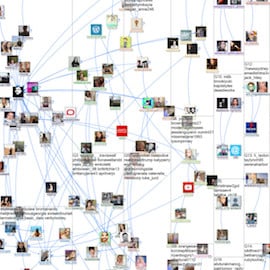Rethinking Credit Scoring: A Pay-As-You-Go Pioneer Explores Innovative Solutions in Africa
Wherever you are in the world, the ability to make life-changing purchases — from buying a vehicle or a home to setting up a business — usually relies upon acquiring credit.
If you want to get a loan in Europe or the U.S., it’s usually a straightforward process. Even if you have a less than impressive credit rating, you can find an accredited loan provider who will offer you a short-term loan (albeit at an exorbitant interest rate). In these more developed economies, credit scoring systems are well-established, with individuals’ financial histories — both revenues and debts — meticulously tracked. Building a credit score is even seen as a common step on the journey into adulthood, with many “credit builder” credit cards on the market, geared toward younger borrowers without extensive financial histories. This enables much easier access to credit — and all of the life-changing products and services it unlocks.
But in many parts of the world — including Africa — it’s incredibly difficult for the average citizen to obtain a credit score at all. And without a credit score to your name, finding a certified lender who is willing to provide you with a loan can be next to impossible. As a result, there is a huge opportunity to transform lives for the better by providing access to the financial services unlocked by credit scores — and these services can be the difference between whether or not African communities are able to become economically self-sufficient.
So why is it so difficult for borrowers on the continent to obtain a credit score? And what can we do about it?
The Obstacles to Credit Scoring in Africa
One of the main obstacles facing these consumers is that, as of 2021, around 1.4 billion adults remain unbanked globally, with an estimated 105 million adults in sub-Saharan Africa among them. Without a bank account — or credit cards, mortgages or loans — there is no formal credit history for these consumers, and credit rating agencies are unable to compile and assess individual consumers’ profiles.
This situation persists because a significant proportion of the African economy is informal and cash-based. While COVID-19 encouraged millions more people in the region to use mobile money payments, most transactions in sub-Saharan Africa still take place using cash, leaving scant paper trails. This is hardly surprising, since the formal financial infrastructure in Africa is limited in its reach, operating primarily within urban areas. But it makes it difficult for the continent’s broader population, which remains largely rural, to access the types of financial products, such as credit cards, that would help them build a credit history. Similarly, financial education is limited, making it more difficult for providers to communicate the value of these products.
All this means that many transactions and financial activities go unrecorded, leaving a significant portion of the population financially invisible to traditional credit bureaus. This gap in data not only stifles individuals’ economic potential but also hampers the continent’s overall economic development.
Clearly, the African market is different from markets with more developed and widespread financial infrastructure. So it needs a different solution to extend credit access to its consumers.
How Pay-As-You-Go Financing Can Transform Credit Scoring
At Bboxx, we have been working across Africa for the past 14 years, initially providing electricity through solar home systems, and more recently expanding into additional essential services including clean cooking, internet access and e-mobility. What makes us unique is the intersection between our Pay-As-You-Go financing model and our innovative technology. For example, by using a proprietary Smart Cooking Valve which interfaces with liquefied petroleum gas canisters, we’re now able to offer Pay-As-You-Go clean cooking solutions that cost less than polluting and harmful traditional cooking methods like charcoal.
Many of our customers are based in rural areas, with no formal bank accounts, pay slips or work contracts. Despite this, our Pay-As-You-Go business model enables us to create credit scores for these customers — something which was previously unthinkable in sub-Saharan Africa. We have built a unique system, powered by the data collected from the Pay-As-You-Go mobile money payments of more than 750,000 customers, that allows us to build reliable credit models for each of our customers and, in turn, offer financing to empower them and their families to transform their lives.
Our model represents a significant departure from previous attempts to offer solar energy and clean cooking solutions, which relied heavily on down payments — an approach that made these products less accessible to those without credit or formal financial histories. By utilising real-time financial data, combined with our ability to remotely control services based on whether or not a customer has paid, we can offer a broader spectrum of services that can be remotely managed — from electricity to mobile internet. And thanks to these live insights into customer financial behaviour, we can extend credit directly to consumers. This approach not only facilitates greater consumer access to essential services, it also generates novel financial data that reinforces our understanding of our customers’ creditworthiness.
The credit score we generate is adjusted based on repayment reliability, weather conditions and other external factors, and customers are advised on how to improve their score. The goal, after all, is to build long-term relationships with our customers. What we have demonstrated is that it is possible to build credit scores which don’t rely on traditional data collection methods or require access to the types of finance and credit-building found in more developed markets.
As you might expect, many of our customers are building digital credit histories for the first time. But despite being excluded from mainstream financial services, our data shows that these customers are highly reliable, and no less deserving of credit access than customers outside of Africa. This model can cover any service that can be switched on or off, and can therefore be plugged into products and services offered by third-party providers, as shown by our recent collaboration with clean cooking partner SP.
Through our data-driven super platform — which includes data coming from any third-party providers that use it — we are collecting in excess of 10 million data points daily, giving us extraordinary power to predict consumer patterns. Thanks to these second-by-second insights, we know that the main factors that affect credit score are education levels, postal code, gender and age. However, as I revealed in an article last year, the single greatest external factor in whether a customer defaults is the weather — a reflection of the profound impact of environmental conditions on economic stability in sub-Saharan Africa, and the power of data to inform economic decision-making.
Beyond its impact on customers, access to real-time data on energy consumption patterns has the added benefit of helping investors to identify the most promising clean energy projects, including off-grid solar projects in rural areas, and energy efficiency and e-mobility initiatives in urban centres. Having live data on repayment rates and credit scores also enables investors to assess the viability of loan-repay services across the continent — all of which benefits African consumers.
In markets lacking centralised financial infrastructure — which include much of sub-Saharan Africa — finance accessed in a decentralised manner, like mobile money, must necessarily be part of the solution. Data shows that the lack of a mobile phone is a common reason cited in sub-Saharan Africa for not having a mobile money account, and that’s one of the reasons Bboxx is partnering with telecommunications companies across Africa (including MTN) to extend internet and mobile money access.
But Bboxx is only one small part of the puzzle. As we have shown, extending access to credit and other financial services is possible even in challenging markets — it just takes a little ingenuity. And that innovation doesn’t have to be limited to tech companies with access to on-the-ground data: Similarly innovative approaches are also needed to enable businesses in Africa to reach previously excluded customers — including through creative new subsidy models.
Innovative Approaches to Consumer Subsidies
Credit scores dramatically improve credit access. If we’re serious about inclusive economic development in Africa, it’s essential to rethink the metrics we use to determine an individual’s ability to repay their debts.
But subsidies can also play a key role in enhancing credit access, by providing targeted financial support that can enable more customers to afford these loans. To help provide that support, as of last year, Bboxx has access to a World Bank subsidy through the Development Bank of Rwanda, which allows us to offer subsidies directly to consumers for our clean cooking solutions. Through this subsidy model, we not only improve customers’ immediate living conditions, we also contribute to the creation of financial identities for millions of unbanked individuals. This then generates novel financial data which can be used to create new credit score information and, in turn, lays the groundwork for a more inclusive financial system that recognises the value and potential of Africa’s informal economies.
However, the application of subsidies in creating financial identities is nuanced. It is not enough to simply provide funds to customers to enable the purchase of new products; these subsidies must be structured in a way that encourages the development of credit histories and financial literacy. Traditional subsidy models in more developed economies often serve to reduce the initial cost barrier that keeps customers from accessing products and services, but they do not necessarily promote long-term financial inclusion or the establishment of credit histories for the unbanked. To be effective in an African context, subsidy models should be dynamic, data-driven and designed to empower consumers to build their creditworthiness. This is possible by leveraging the ubiquity of mobile technology to facilitate micro-transactions that can be recorded as evidence of financial reliability — in essence, by integrating subsidies with the Pay-As-You-Go model. Additionally, subsidies could be contingent on consistent usage and timely payments, which would contribute positively to an individual’s credit score.
Subsidies should act as a bridge, connecting unbanked individuals to the formal financial sector by enabling them to demonstrate creditworthiness through alternative means. By aligning subsidy distribution with the achievement of key financial behaviours, we can foster a more inclusive financial ecosystem that extends beyond temporary financial relief and into lasting economic empowerment. This paradigm shift can pave the way for innovative financing models that recognise and capitalise on the robustness of informal economies, and in doing so, democratise access to credit across the continent. With the right approach, subsidies can be transformed from a simple form of financial aid into a powerful tool for financial identity formation, giving rise to a new era of economic opportunity and stability in Africa.
Similarly, the success of Bboxx’s model underscores the urgent need for a broader application of innovative credit scoring models and greater mobile money access across the region. By embracing these approaches, we can unlock immense potential, facilitating economic participation and empowerment on an unprecedented scale. However, this requires a collective effort from both local businesses and international credit rating agencies to recognise and incorporate informal economies into the broader financial ecosystem. Without models like ours, which allow unbanked people to share access to the data which enables this progress, these customers will continue to be overlooked.
As we look to the future, we must challenge ourselves and the global financial community to think innovatively about credit scoring in Africa. The inclusion of informal economies in credit analysis, the integration of non-traditional financial data, and the adoption of technology-driven solutions like Bboxx’s are critical steps toward widening economic participation.
It is my aim that, in the future, more financial institutions will understand the positive role they have to play in the lives of unbanked, overlooked people, both in Africa and around the world.
Mansoor Hamayun is the CEO and Co-Founder of Bboxx.
Photo courtesy of cottonbro studio.
- Categories
- Finance



